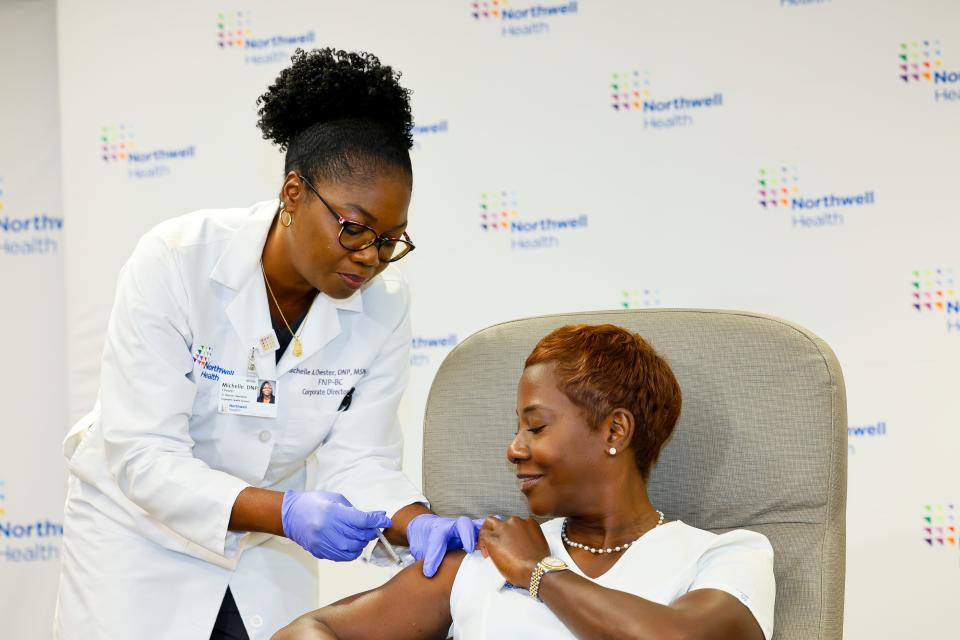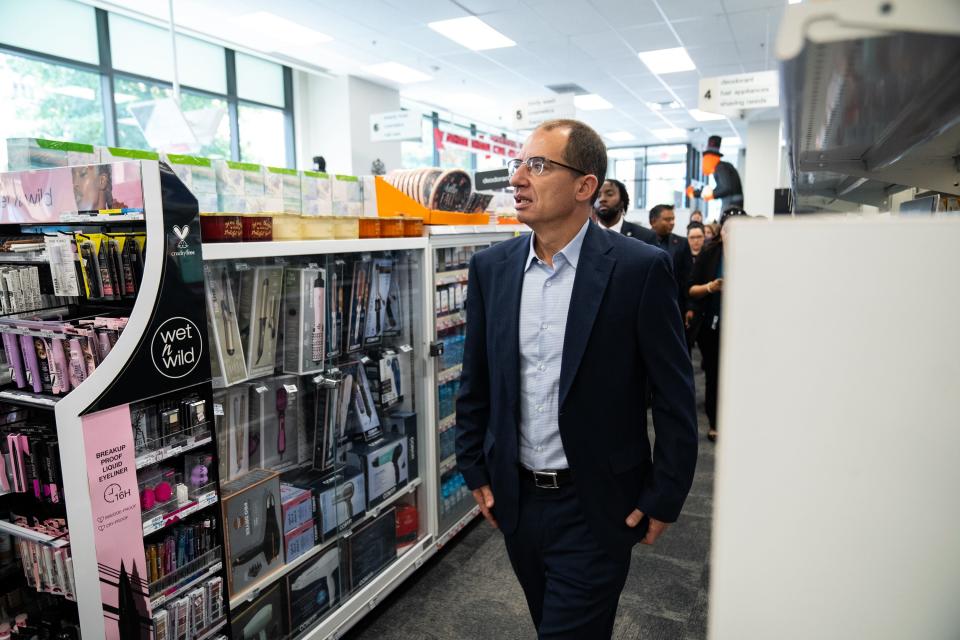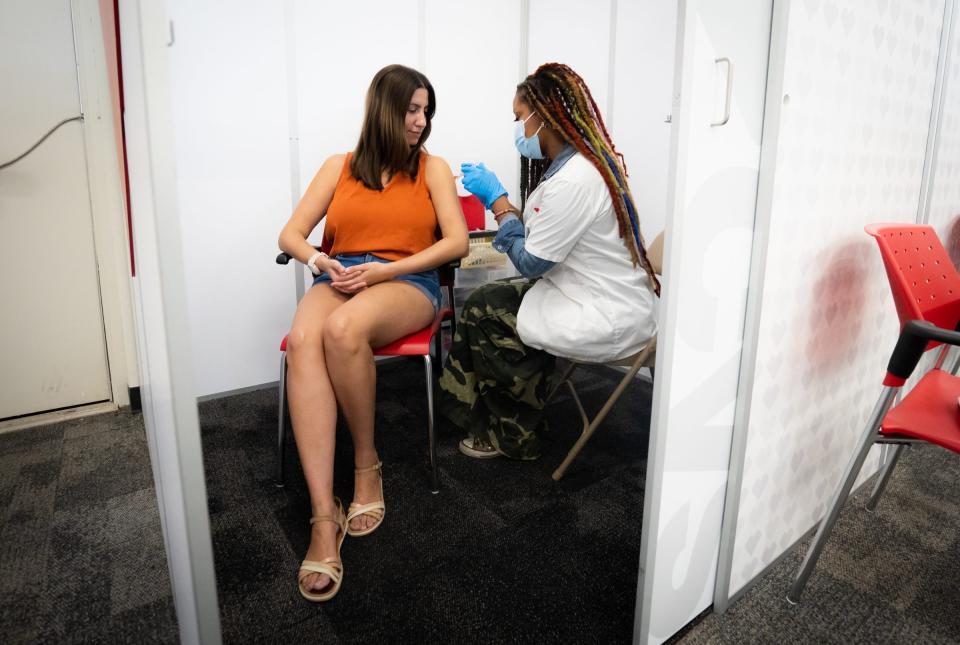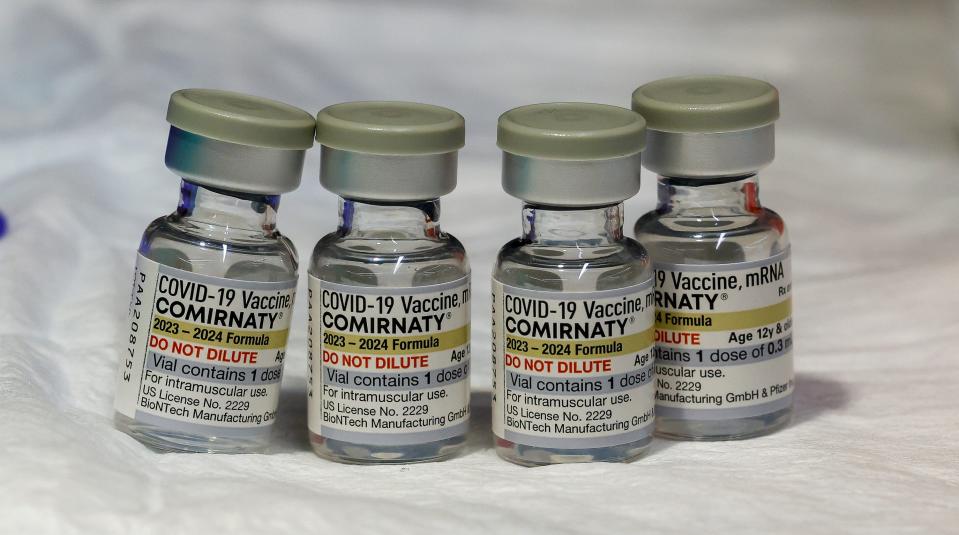Should you get a COVID booster? Here are 7 things to consider.
- Oops!Something went wrong.Please try again later.
An updated COVID-19 vaccine has been available since last month, and more than 7 million Americans have gotten boosted since then.
But many people are still on the fence about whether and when to get a shot.
Experts say when and whether to get a COVID-19 booster should depend on your health status, risk tolerance, timing of last infection and other personal factors.
The new booster is targeted to the XBB.1.5 variant. Though that variant is no longer in circulation, studies suggest the vaccine will still prevent severe disease from other omicron variants that are more common now, including EG.5, FL.1.5.1, HV.1 and XBB.1.16.6.
Here are a handful of things to think about before heading to an appointment and rolling up your sleeve:
Are you at higher risk for severe infection?
People likely to get very sick if infected should take the most care to be protected, experts say.
Those at highest risk include people with weakened immune systems because of:
Age: Typically, this includes people over 65, though older people can wait if they're healthy and younger people with ailments such as diabetes should move more quickly to get vaccinated.
Pregnancy: The Centers for Disease Control and Prevention and the American College of Obstetricians and Gynecologists say the vaccines are safe at any time during pregnancy and it's safer for both parent and baby to be vaccinated than risk getting infected.
Health-compromised: People who are medically vulnerable should take precautions, especially those in treatment for blood cancer.
Immunocompromised: If you're taking medications that tamp down the immune system, such as those for rheumatoid arthritis or after an organ transplant, experts say you should get a booster.

Do you have a major life event coming up?
Is there something coming up you absolutely can't miss, like a wedding? Or anything three to four months from now?
If the event is coming up, you'll want to get a shot sooner rather than later.
Although initial vaccines took about two weeks to take effect, a booster is likely to take less time because it works as a reminder to a system that's already primed, said Dr. Michael Mina, an epidemiologist and immunologist, formerly at the Harvard T.H. Chan School of Public Health.
But current vaccines will protect against all infections for only about three months, so if that wedding or big European vacation is more than three or four months away, it's a better idea to put off your booster a little longer, said Mina, who is now chief science officer at eMed.
To avoid infection until then, consider wearing a high-quality mask when you're in a crowded indoor space, like a concert hall, or when you take public transportation.
Have you recently gotten the virus?
If you had a case of COVID-19 in late summer or early fall, you'll have protection against another infection for about three to four months, studies suggest.
Protection isn't like a light switch. You won't be safe on Tuesday and vulnerable on Wednesday. It happens gradually.
And it's impossible for experts to predict exactly when that protection will fade enough to leave you vulnerable or unexpectedly exposed to the virus.

Is COVID-19 likely to get bad again?
This is a big unanswerable question. For the past three years, the holiday season has triggered a spike in cases that peaked each year in January.
But it's unclear whether that pattern will repeat this year.
Unlike the flu, in which cases drop very low during the off-season, COVID-19 has continued to transmit since its first appearance, so it can take off anytime.
There isn't a COVID-19 season, per se. But there have typically been two annual peaks with COVID-19 since its initial spike in early 2020: one in the summer, although this year's stretched on later – possibly because of a sweeping heat wave in July; and one starting around Thanksgiving and ending early in the new year.
Experts don't think the next peak will be as high as it has been in previous winters, just as this summer's peak was not as high as it was in 2020, 2021 or 2022.
Should I get flu and COVID shots simultaneously?
The CDC says it's perfectly safe to get the two shots at the same time.
Only you know yourself. If you're the type of person who's not likely to come back for a second shot, seize the moment and get both.
If you've had side effects from one or both ‒ spent a day on the couch after your last COVID-19 booster or had a sore arm for a week after a flu shot ‒ consider putting some space between them, but only if you're the kind of person who will come back for the second one.

Does it matter which vaccine I get?
No. There's not much difference among the three authorized vaccines. Two, from Pfizer-BioNTech and Moderna, are based on mRNA technology, which directs the body to make the spike protein found on the surface of the SARS-CoV-2 virus.
The third, from Novavax, provides the same protein directly.
All three remind the immune system what the spike protein looks like, so when an infection arrives, it will be ready to quickly respond.
If you have had rough side effects after getting an mRNA vaccine, you might consider getting the Novavax shot this time, said John Moore, a professor of microbiology and immunology at Weill Cornell Medical College in New York.
As for mixing shots, that has been part of the dialogue since COVID-19 arrived, and now there's more clarity: Studies haven't shown a significant benefit to mixing and matching vaccines.

What if I'm young and healthy? Do I really need another booster?
The short answer is: probably not, as long as you don't mind being sick for a week or two.
People who are young, healthy and have already been infected or vaccinated more than once are very unlikely to get extremely sick or die from COVID-19.
The risk of contracting long COVID, in which symptoms linger for months or longer after an initial infection, has also been shown to be much smaller for people who are vaccinated, particularly those who have had three shots.

For young, healthy people, the main benefit of a COVID-19 booster will be small and short-lived: protection against infection for about three to four months and another hedge against the slight risk of severe disease.
Many people get an annual flu shot, not to avoid death but because they don't want to miss work or life or be miserable for a few weeks. The same is true for COVID-19.
Also, as with the flu, if you don't get infected for those few months, you won't pass that infection on to someone else ‒ which is important for people with older friends or relatives and those who work around vulnerable people.
Contact Karen Weintraub at kweintraub@usatoday.com.
Health and patient safety coverage at USA TODAY is made possible in part by a grant from the Masimo Foundation for Ethics, Innovation and Competition in Healthcare. The Masimo Foundation does not provide editorial input.
This article originally appeared on USA TODAY: Should you get a COVID booster? Here are 7 things to think about.

